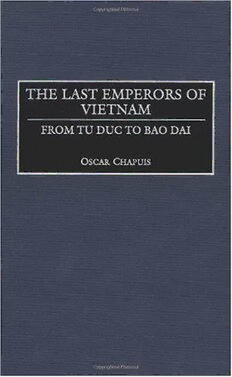Download The Last Emperors of Vietnam: From Tu Duc to Bao Dai (Contributions in Asian Studies) PDF Free - Full Version
Download The Last Emperors of Vietnam: From Tu Duc to Bao Dai (Contributions in Asian Studies) by Oscar Chapuis in PDF format completely FREE. No registration required, no payment needed. Get instant access to this valuable resource on PDFdrive.to!
About The Last Emperors of Vietnam: From Tu Duc to Bao Dai (Contributions in Asian Studies)
This book tells the story of French interaction with Vietnam and the neighboring region, which began with the French seizure of Cochin-China and Tonking in the 19th century under Emperor Tu Duc and ended with their humiliating defeat at Dien Bien Phu in 1954. After the conclusion of treaties with China in the nineteenth century, Western nations sought access to the resource-rich region of Yunnan. After attempts at exploring the Mekong River, the French turned their sights to the Red River. Only after Jean Dupuis successfully linked Hanoi with Yunnan was Admiral Dupre able to begin the conquest of Tonking. This volume begins where Chapuis's History of Vietnam left off, completing the colonial history of Vietnam.The decline of French authority in Indochina began with Japanese demands and subsequent occupation during World War II. The 9 March 1945 Japanese coup would mark the beginning of the end of French supremacy; however, French authorities would return with troops to confront the Vietnamese demands for unity and independence after Japan's defeat. Although an agreement between Sainteny and Ho Chi Minh would allow the French army to land in North Vietnam, the creation of the southern Republic of Cochin-China would be a move that ran counter to Vietnamese nationalist sentiment. Nine years later, the French found themselves ousted from their former colony.
Detailed Information
| Author: | Oscar Chapuis |
|---|---|
| Publication Year: | 2000 |
| ISBN: | 9781567507331 |
| Pages: | 202 |
| Language: | English |
| File Size: | 1.043 |
| Format: | |
| Price: | FREE |
Safe & Secure Download - No registration required
Why Choose PDFdrive for Your Free The Last Emperors of Vietnam: From Tu Duc to Bao Dai (Contributions in Asian Studies) Download?
- 100% Free: No hidden fees or subscriptions required for one book every day.
- No Registration: Immediate access is available without creating accounts for one book every day.
- Safe and Secure: Clean downloads without malware or viruses
- Multiple Formats: PDF, MOBI, Mpub,... optimized for all devices
- Educational Resource: Supporting knowledge sharing and learning
Frequently Asked Questions
Is it really free to download The Last Emperors of Vietnam: From Tu Duc to Bao Dai (Contributions in Asian Studies) PDF?
Yes, on https://PDFdrive.to you can download The Last Emperors of Vietnam: From Tu Duc to Bao Dai (Contributions in Asian Studies) by Oscar Chapuis completely free. We don't require any payment, subscription, or registration to access this PDF file. For 3 books every day.
How can I read The Last Emperors of Vietnam: From Tu Duc to Bao Dai (Contributions in Asian Studies) on my mobile device?
After downloading The Last Emperors of Vietnam: From Tu Duc to Bao Dai (Contributions in Asian Studies) PDF, you can open it with any PDF reader app on your phone or tablet. We recommend using Adobe Acrobat Reader, Apple Books, or Google Play Books for the best reading experience.
Is this the full version of The Last Emperors of Vietnam: From Tu Duc to Bao Dai (Contributions in Asian Studies)?
Yes, this is the complete PDF version of The Last Emperors of Vietnam: From Tu Duc to Bao Dai (Contributions in Asian Studies) by Oscar Chapuis. You will be able to read the entire content as in the printed version without missing any pages.
Is it legal to download The Last Emperors of Vietnam: From Tu Duc to Bao Dai (Contributions in Asian Studies) PDF for free?
https://PDFdrive.to provides links to free educational resources available online. We do not store any files on our servers. Please be aware of copyright laws in your country before downloading.
The materials shared are intended for research, educational, and personal use in accordance with fair use principles.

